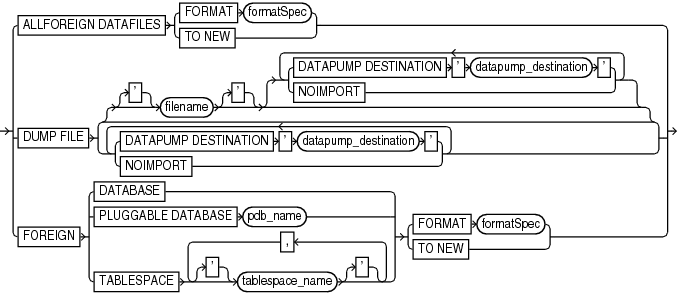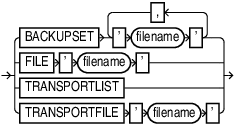4.10 foreignFileSpec
Purpose
Use the foreignFileSpec subclause to provide the information required to perform a cross-platform restore operation. This information includes the name of the backup set that contains the cross-platform backup and details of objects or files that must be restored.
Usage Notes
Specifying a foreignFileSpec is mandatory to perform a cross-platform restore operation. You can restore tablespaces even if the source platform and the destination platform use different endian formats.
Syntax
foreignFileSpec::=
(xfileList::=, xforeigndfList::=, handleNameList::=)
xfileList::=
xforeigndfList::=
privoptpdb::=
handleNameList::=
Semantics
xfilelist::=
| Syntax Element | Description |
|---|---|
|
Specifies that all the data files contained in the cross-platform backup set must be restored. Use |
|
|
|
Specifies a pattern for the restored data files in the destination database. |
|
|
Specifies that the data files must be restored to the location specified by the |
|
Specifies that the backup set containing the Data Pump export dump file must be restored. The name of the backup set containing the dump file is specified using the
|
|
|
|
Specifies the location to which the export dump file must be restored. If you omit this clause, the export dump file is restored to an operating system-dependent default location. The database must be opened in read-write mode when this clause is used, otherwise an error occurs. |
|
|
Specifies that the export dump file must be restored, but not imported into the destination database. Because the export dump file is not imported, the tablespaces are not plugged in to the destination database. You need to manually import the dump file into the destination database using the Data Pump Import to plug the tablespaces. |
|
|
Excludes statistics from the data pump export operation. To avoid creating large memory demands, you can choose to exclude statistics data in the export dump file. Use any or all of the following keywords to specify the criteria for
EXCLUDE:
|
|
|
Specifies the name of the unplug XML file that is created after a PDB is unplugged from a source PDB. Starting with Oracle AI Database 26ai, you can use regular RMAN backups of a PDB to transport the PDB from a source database to a destination database. If you are transporting a PDB using a backup of the PDB and an unplug XML file made in a previous release of Oracle Database, then you must include the See, Backup and Recovery User's Guide to learn more about the transporting PDBs using PDB backups. |
|
|
Specifies the directory where you want to extract and store the PDB unplug XML file on a destination database. |
|
|
Specifies that the entire CDB must be restored from a cross-platform backup set. Use
When |
|
|
Specifies that the pluggable database (PDB) specified by The CDB must not be mounted or else an error occurs. |
|
|
Specifies the tablespaces that must be restored from the cross-platform backup set. The names of the tablespaces must be the original tablespaces names in the source database. Use |
xforeigndfList::=
| Syntax Element | Description |
|---|---|
|
|
Restores the specified data files that are contained in a cross-platform backup. You can choose to restore only some of the data files contained in the cross-platform backup set. Use
|
|
|
Specifies a pattern for the restored data files in the destination database. |
|
|
Specifies that the data files must be restored to the location specified by the DB_CREATE_FILE_DEST initialization parameter using Oracle Managed File (OMF) names.
|
|
pdb_name |
Specifies that the pluggable database (PDB) specified by pdb_name must be transported to a destination database by using PDB backups. You can use regular PDB backups to transport a PDB from a source CDB to a destination CDB. When you perform the restore operation on a destination database, use the Use the See, Backup and Recovery User's Guide to learn more about transporting a PDB using a backup of the PDB. |
|
|
Specifies the tablespace specified by tablespace_namethat must be transported to a destination database by using the tablespace backups. You can use regular tablespace backups to transport a tablespace from a source database to a destination database. When you perform a restore operation on the destination database, use the Use the See, Backup and Recovery User's Guide to learn more about transporting tablespaces using tablespace backups. |
|
|
Specifies a pattern for the restored data files in the destination database. |
|
|
Specifies that the data files must be restored to the location specified by the |
privoptpdb::=
| Syntax Element | Description |
|---|---|
|
|
Specifies that RMAN must restore the data files of a new pluggable database (PDB) to an existing CDB. Specify either the name or the GUID that identifies the PDB. Use |
handleNameList::=
| Syntax Element | Description |
|---|---|
|
|
Specifies the backup set that contains the cross-platform backup that must be restored. Most backup sets contain only one backup piece. However, you can create a backup consisting of multiple backup pieces by configuring If a cross-platform backup consists of multiple backup sets, then you must use a separate |
|
|
Specifies that RMAN needs to use a transport list to identify the exact backups required for a restore operation on a destination database. You must have previously run the Starting with Oracle AI Database 26ai, you can use regular RMAN backups to transport tablespaces and pluggable databases (PDB) from a source platform to a destination platform. On a destination database, RMAN restores the data files from the backups created on the source database, and then plugs in a tablespace or a PDB on the destination database to complete the data transport process. If the source database and the destination database are connected to the same recovery catalog, then RMAN queries the recovery catalog metadata to determine the exact backups required to perform the restore operation on a destination database. RMAN generates a transport list, which is an in memory list of backups. During the restore operation, RMAN uses the transport list to restores the data files from backups. On the destination database, connect RMAN to the same recovery catalog as the source database. Next, Use the You can then run the See, Backup and Recovery User's Guide to learn about transporting PDBs and tablespaces using regular backups and recovery catalog connection. |
|
|
Specifies the You must have previously created the transport file on the source database. You must ensure to store the transport file in a location that is accessible to the destination database. Starting with Oracle AI Database 26ai, you can use regular RMAN backups to transport tablespaces and pluggable databases (PDB) from a source platform to a destination platform. On a destination database, RMAN restores the data files from the backups created on the source database, and then plugs in a tablespace or a PDB on the destination database to complete the data transport process. When a recovery catalog is not used, the transport file is used to store the backup metadata in XML format. RMAN requires the transport file to restore the data files from backups and plug in the restored tablespaces or PDBs into to a destination database. The transport file is specified using filename. On the source database, use the Then, run the See, the Backup and Recovery User's Guide to learn how to transport PDBs and tablespaces using regular backups. |
Examples
Example 4-23 Restoring all Data files from a Cross-Platform Backup
In the following example, the backup set Oelmdipc_1_1 was created in the source database for cross-platform tablespace transport. The RESTORE command, with foreignFileSpec, is used to restore all data files contained in this cross-platform backup in the destination database. The destination database must be open in read-write mode.
RESTORE
ALL FOREIGN DATAFILES TO NEW
FROM BACKUPSET '/net/oracle/restores/Oelmdipc_1_1';
See Also:
"RESTORE" for additional examples on restoring cross-platform backups




